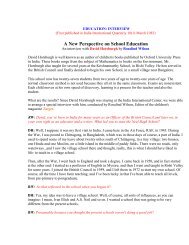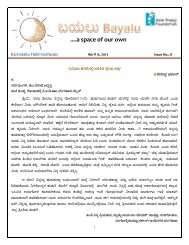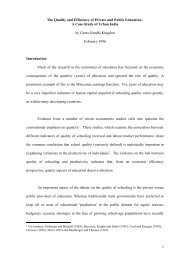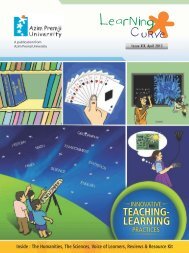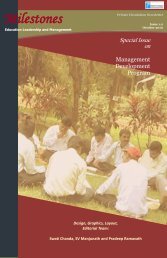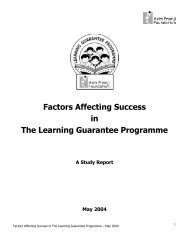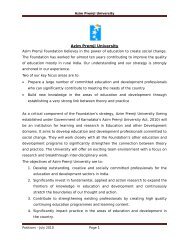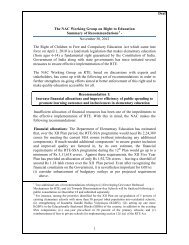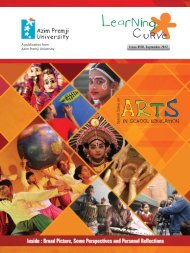Indesign Pagesnew.indd - Azim Premji Foundation
Indesign Pagesnew.indd - Azim Premji Foundation
Indesign Pagesnew.indd - Azim Premji Foundation
Create successful ePaper yourself
Turn your PDF publications into a flip-book with our unique Google optimized e-Paper software.
other. National governments in Europe must deal with this<br />
challenge delicately, as the benefi ts of union are countered<br />
by a strong skepticism towards the EU on the part of<br />
many voters. In some ways, it is not unlike the tug-of-war<br />
between the multiculturalists and the traditionalists in the<br />
U.S. Because they play a key role in forming citizens’ political<br />
and national identities in ways that other subjects do not,<br />
the social sciences seem always to be stuck between two<br />
(or more) competing visions of how society ought to look<br />
and function.<br />
In the world’s newer democracies, such as those in Africa and<br />
the former Soviet bloc, this same tension between tradition<br />
and progress is evident in the social science curriculum.<br />
These countries tend to be more socially conservative<br />
than the U.S. and Western Europe and are not as likely to<br />
emphasize critical thinking and individual agency. Even so,<br />
they recognize that they “need the social sciences more<br />
than ever, in order to confront the major challenges facing<br />
humanity, such as poverty, epidemics and climate change”<br />
in the words of the World social science Report 2010.<br />
Ironically, much of sub-Saharan Africa’s inability to address<br />
civic competencies through education is exacerbated by the<br />
structural adjustment programs imposed by the global North,<br />
which force poor countries to cut education spending. The<br />
expressed desire of rich countries to aid new democracies<br />
is unlikely to bear fruit if those democracies are unable to<br />
prepare their students for the responsibilities of citizenship.<br />
Furthermore, research fi ndings as to the effectiveness<br />
of social science education indicate that a participatory,<br />
learner-centered pedagogy is the best means of teaching<br />
civic concepts. That pedagogy is far more prevalent in the<br />
global North than in the global South, where the more<br />
traditional method of teacher-centered rote learning is the<br />
norm. Despite these challenges, some African countries<br />
are making strides in social science education, a feat made<br />
particularly impressive by the history of confl ict in many<br />
of these places. In Rwanda, for example, the Ministry of<br />
Education has not shied away from requiring that students<br />
learn about the 1994 genocide, including the role of the<br />
Section B<br />
Building Tomorrow’s Citizens: A Brief Survey of Social Science Education Across the Globe<br />
media in the violence between Hutus and Tutsis. In South<br />
Africa, which is still toiling to heal the wounds of apartheid,<br />
the national curriculum strives across subject areas “to be<br />
sensitive to issues of poverty, inequality, race, gender, age,<br />
disability, and such challenges as HIV/AIDS.” It is certainly<br />
no easy task to face the demons of the past, but only by<br />
telling its students the truth about their history can a country<br />
hope to build a peaceful future.<br />
Iraq is a country coming to grips with its recent past and<br />
fi guring out how to address it in schools. A recent New<br />
York Times article, “In Rewriting its history, Iraq Treads<br />
Cautiously,” illuminates the diffi culty of overhauling the<br />
social science curriculum in the midst of confl ict. Noting<br />
that history education in Iraq was, up until the ouster of<br />
Saddam Hussein, “a tool for indoctrination into the ways<br />
of the Baath Party and a mechanism to promote the cult of<br />
Mr. Hussein,” the piece shows that since his death there has<br />
been no agreement among the various sects in the country<br />
over whose version of history should be taught in schools.<br />
Again, the tension here over who gets to defi ne social<br />
science standards echoes the struggle elsewhere in the<br />
world, between multiculturalists and traditionalists and<br />
Eurocentrists, between EU supporters and EU skeptics, and<br />
between participatory pedagogy and rote learning. While it<br />
is easy to become discouraged in the face of these seemingly<br />
unbridgeable different points of view, it is also possible<br />
to create out of the discord a teachable moment, and as<br />
educators, that is what we must do. As the World social<br />
science Report 2010 reminds us, social science education<br />
helps us to “understand how the world works from the ways<br />
humans interact.” The debate over how best to deliver social<br />
science education is itself a lesson for the next generation<br />
of citizens; if we can address our disagreements with civility<br />
and a sense of shared purpose, we will be showing them<br />
what it means to be responsible and engaged members<br />
of the global community. Indeed, fi nding solutions to our<br />
gravest shared challenges—from poverty to war to climate<br />
change—depends upon how effectively we teach social<br />
science today.<br />
Ann Horwitz received her master’s degree in International Education Policy from Harvard University. She is<br />
a consultant in the Section for Education in Post-Confl ict and Post-Disaster Situations at UNESCO in Paris. She<br />
may be contacted at ann.horwitz@gmail.com<br />
Pg No: 51



